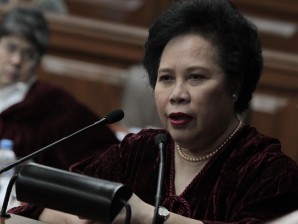Senator Miriam Defensor-Santiago’s fearless forecast that the 2013 elections would play a big factor in the outcome of the impeachment trial of Chief Justice Renato Corona drew mixed reactions from her colleagues.
Reelectionist Senators Gregorio Honasan and Antonio Trillanes IV on Monday admitted that members of the Senate, sitting as an impeachment court, were sensitive to public opinion, and were not immune from the persuasive effects, if any, of prevailing public perception of the Chief Justice’s guilt or innocence.
However, the two senators differed in how they rated the degree to which the next senatorial race would be a factor in deciding the impeachment case.
In a phone interview, Honasan admitted that 2013 would be a “factor, but not big” enough to sway the decision of senators.
Asked about the other factors, Honasan said: “Consistency, long-term credibility, political threshold for mob mentality [and] transactional-market driven politics, internal values, principles, public/national interest, moral courage, and affirmative action that goes beyond rhetoric.”
Trillanes was not surprised by Santiago’s warning that Malacañang would be courting each senator-judge during the six-week Lenten break of the Senate.
“It should be a factor. We are supposed to be representatives of the people, so we are answerable to them. If our vote in this impeachment trial is not acceptable to them, they may not renew our mandate,” said Trillanes, who won a Senate seat in 2007 while behind bars for leading the “Oakwood mutiny” three years earlier.
“Since this is a public trial, the people can also see and appreciate the evidence and are making judgments of their own. And they expect their senators, who are their representatives, to have the same judgment. If they are not aligned with [public opinion], they may choose a different representative/senator in the next election,” he said.
Trillanes said he expected the voters to elect “someone who will reflect their true will and sentiment. That’s how a representative democracy works.”
He took exception to Santiago’s statement in a radio interview on Sunday that Malacañang could offer a reelectionist senator to run on the administration ticket and enjoy its funds and organization.
“We are exposed to different interest groups and lobby groups trying to influence our position on policy issues and legislation, so this is no different. So we should not be alarmed because it is part and parcel of the job of a senator,” Trillanes said.
He cited the influence of big lobby groups from the Catholic Church and prolife advocates that, for years, had successfully blocked the passage of the reproductive health bill in both chambers of Congress.
“Is there anything wrong with that? None,” Trillanes said.
“Malacañang has an official lobbyist assigned in the Senate—the presidential legislative liaison officer, with a Cabinet rank. There’s also the Ledac (Legislative Executive Development Advisory Council). There are legal mechanisms or influences. Even if the lobby does not go through these avenues, it doesn’t make it illegal.”


No comments:
Post a Comment